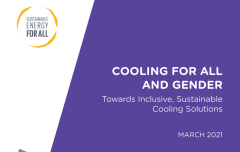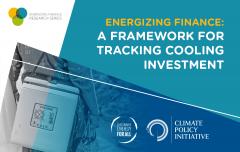Inclusive, sustainable cooling solutions must reflect differing needs of women and men
Cooling services and technologies protect people from heatwaves and refrigerate food and vaccines like those currently being rolled out for COVID-19. With so many people’s well-being dependent on it, cooling access is a matter of equity.
Just as women and girls face challenges gaining access to education, healthcare and formal employment, their ability to access and benefit from the range of services that cooling provides is also limited. A lack of access to electricity and cooling appliances can impact women differently than men and can exacerbate existing gender inequalities.
New research from Sustainable Energy for All (SEforALL) offers a first-of-its-kind analysis of the gender-based impacts of a lack of access to cooling. The report Cooling for All and Gender: Towards Inclusive, Sustainable Cooling Solutions specifically looks at how a lack of cooling affects men and women differently in terms of health and well-being, poverty and household dynamics, and in the workplace.
As such, the report highlights the challenges that should be considered, analysed and addressed to ensure cooling interventions and finance acknowledge gender-differentiated impacts and adapt to maximize equitable access.
For example, in terms of health and well-being, women stand to gain even more from access to refrigeration for food since often it is women in developing countries who are tasked with food preparation and purchasing. Ownership of refrigeration appliances is linked to better nutrition and safer food preparation within households. In addition, refrigeration can improve women’s overall labour productivity, reduce drudgery and increased the amount of free time available to engage in productive activities outside the household.
“In the push to deliver sustainable cooling for all, policies and business decisions must be gender-responsive,” said Brian Dean, Lead of Energy Efficiency and Cooling at SEforALL. “The reality is that women and men have different cooling needs and will benefit in different ways from gaining cooling access. Factoring in these differences is critical if we want to achieve equitable outcomes from cooling services.”
Importantly, the brief offers a series of recommendation that will help ensure that the pursuit of universal sustainable cooling supports gender equality. These include:
- Improve data and evidence to inform decision-makers - The report encourages sex-disaggregated collection of data to support tracking access to cooling, and establishing gender-differentiated measurement and evaluation of policies and initiatives.
- Develop policies that support workplace safety, community heat planning and personal comfort - These policies could include implementing heat action plans that support gender equality in achieving access to cooling in urban heat islands and extreme heat events. Expanding enforceable workplace protections, particularly for women-led occupations and sectors employing vulnerable populations, such as migrant workers, is also advised.
- Increase investment in gender-transformative solutions - Investment strategies can have the explicit goal of supporting solutions that remedy disparities of impacts and vulnerabilities across genders. They can also seek to finance women-driven solutions, products and business models.
- Increase attention of the need for sustainable cooling for all - Far greater attention needs to be paid to the growing need for sustainable cooling solutions that protect both men and women. Governments, businesses and their partners should support education of heat adaptability and communicate information to prevent impacts of extreme heat. The This Is Cool campaign seeks to build such awareness.
Several other recommendations can be found in the report Cooling for All and Gender: Towards Inclusive, Sustainable Cooling Solutions.
For more information on sustainable cooling, sign up to SEforALL’s Cooling for All newsletter.





